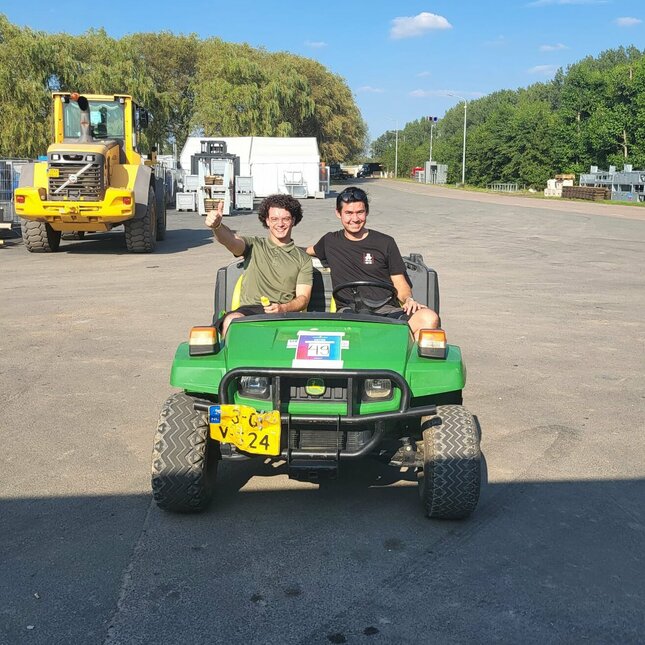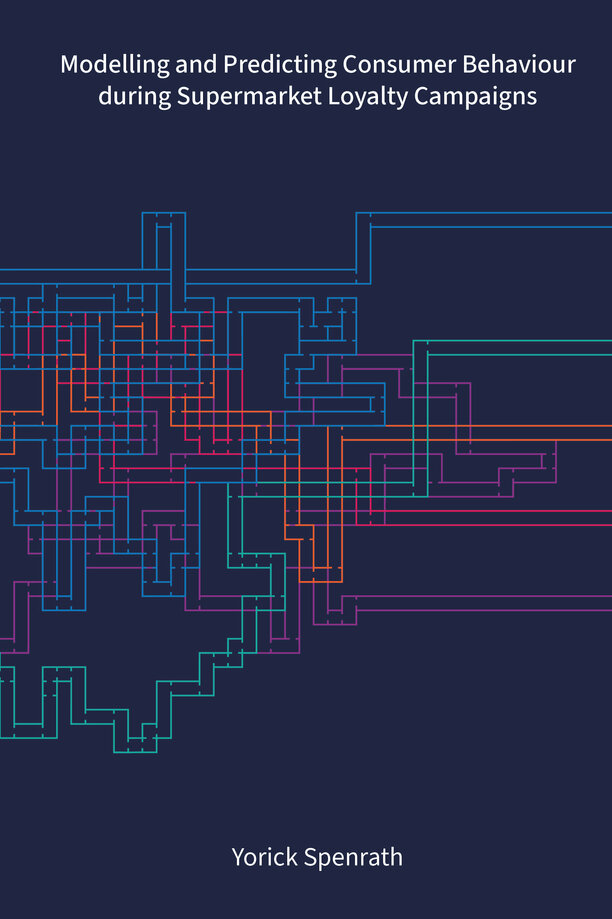Coupons, loyalty card, Air Miles… Anyone who shops at the major supermarket chains is familiar with them. But how does your shopping behavior change when you participate in a supermarket loyalty campaign? Do you put extra products in your basket for a nice piece of kitchenware or that one missing sports card? Armed with 70 million receipts and a mathematical perspective, data scientist Yorick Spenrath studied human behavior with the aim of improving supermarket loyalty programs. He defended his PhD thesis at the Department of Mathematics and Computer Science on October 2nd.
Source: Cursor / Nicole Testerink
This is a story about a supermarket. About customers that go to that supermarket, buy certain products there, and either participate or don't participate in certain campaigns. But this is also a math story, about algorithms and big data, because a supermarket likes to have an insight into how the promotional campaign is going and wants to be able to predict who will participate. How can they make sure as many people as possible do?
That's why PhD candidate Yorick Spenrath spent the past four years working together with marketing company BrandLoyalty to research how people shop at supermarkets and to fit this consumer behavior into a mathematical model. He defended his dissertation on October 2nd. It's a voluminous book, full of coupons the reader can 'collect', but more on that later.

Jack of all trades
"Do you get out pen and paper on Saturday morning to plan the week's groceries, or do you only buy what you need in the evening after work?" is the first of many questions Yorick Spenrath fires at me. "Do you always carry your loyalty card? And what you do if your favorite brand of chocolate is on sale, but isn't on your list? And will it affect your choices if you're participating in a promotional campaign?"
He just can't stop talking about his research, he confesses with a smile. "I have a wide target group, because everyone shops for groceries. Which is why I also think I should be able to explain to anyone - from my professor and the marketing officer to my next-door neighbor - what I do." Then, with a wink: "I'm a jack of all trades."
No kidding. There were months he was working on several events at the same time, alongside his PhD. Organizing a festival, working the DJ booth at a friend's party or wedding, and founding the PhD association NEXUS.
"I like to bring people together; that gives me loads of energy." So much energy, in fact, that he spent the past few months - after he had turned in his manuscript - helping out at event agency SOLID. "With the steel toecaps in the mud," is how he summarizes it. "A real festival summer. Handing out entry wristbands at Milkshake, behind the scenes at Defqon.1, Mysteryland, and last week at TU/e's very own MomenTUm. And making a lot of new contacts in the process. It's an entirely different world, but a fun one. I'm the odd one out there, but thanks to the 'helicopter view' I developed as a scientist, I can contribute in an original way. I follow the path that feels right to me, creating my own dream job as I go."

PHD IN THE PICTURE
What is that on the cover of your dissertation?
"The five mindsets, in different colors, going from a chaotic to an understandable pattern. And for those who really understand: if you put the little blocks next to each other like numbers and translate them into letters, they'll spell out a word. I like a bit of nerdy humor; my dissertation is full of Easter eggs. And full of coupons by the way, which you can find in every chapter. You can scan a QR code to solve a puzzle and complete the entire promotion card on the invitation. Those who stick with it to the end will receive an appropriate reward. A bit of reader loyalty, if you will."
You're at a birthday party. How do you explain your research in one sentence?
"I research people's motives for going to the supermarket and whether we can use that behavior to predict whether customers will participate in a promotional campaign. But usually, I just ask two questions: do you ever shop for groceries and, if so, do you use a loyalty card? And before you know it, you're suddenly the supermarket expert."
How do you blow off steam outside of your research?
"I love to organize things, like festivals or parties. And with my love of music, I've been in the DJ booth for over 13 years. My personal favorites are dance, house, and techno, but at weddings it can be completely different. I always do a bit of stakeholder research."
What tip would you have liked to receive as a beginning PhD candidate?
"That it's also okay to sometimes take your research in the wrong direction. At the start of my project, I was a bit stressed out about that. You want to show something new at each meeting, so everything must go right. But it's by trying out things, by leaving behind the beaten path, that you acquire new insights. Going into a different direction may feel like you're taking the long way around, but in the end, you'll get to where you need to be."
What is your next step?
"It's still a work in progress. I'm following my heart by doing what gives me energy. That's why I'm currently in talks on the intersection between data and events - crowd management - but the more practice-oriented side of organizing is also still open."
Compartmentalize
Back to the supermarket coupons. The promotional campaigns in the supermarket that involve collecting enough points to exchange them for a reward - kitchenware, stuffed animals, sports cards - were the focus of his PhD research for four years.
"The time-bound loyalty programs," Spenrath confirms. With these campaigns, supermarkets try to attract customers - preferably new ones - that are tempted into spending just a little bit more. To gain more insight into these campaigns, Spenrath was given almost seventy million receipts.
But to magically turn those into a model that can predict consumer behavior isn't that simple, Spenrath explains. "Each person is unique, and it's difficult to compartmentalize behavior and feelings. And that's exactly what we, as data scientists, like to do. Our methods are based on numbers, and we try to cluster those. How do you get from those feelings, and everything that influences them, to those numbers?"
Full shopping cart
Well, with those millions of receipts, a bit of psychology, and - above all - lots of math. But first, Spenrath asks us the following question: what motives do people have for going to the supermarket?
"People have been doing loads of market research since forever. In most of those studies, consumers are divided into set groups based on demographic data: a busy stay-at-home mom, a bargain hunter, or a highly-educated professional."
But you can also look past these traditional roles and shift your focus to why people visit a shop, Spenrath explains. People can have several mindsets, i.e., motivations for going to the supermarket. Take a manager that shops for a quick meal outside of office hours but loads up the shopping cart with on-sale toilet paper with the kids on Saturday. Retail marketeers work with five main mindsets that reflect how consumers shop for groceries, and this functioned as Spenrath's point of departure for his quest to make sense of the data chaos.
He therefore set out for receipts that were similar in one way or another. "We wanted to make segments, but then you first must determine if and how this is possible. And a model will only get you so far. I mean, it's great if the model works in a pilot with a hundred people, but in the end, you're talking about hundreds of thousands of supermarket visitors in practice. Will it still work just as well? And the method must be efficient and fast, otherwise marketing companies won't use it."
Extra cards and kitchenware
And that's the final goal, Spenrath emphasizes. "Because supermarkets really want to know how they can convince hesitant customers to participate in promotional campaigns. Customers that participate bring in more revenue. And even if that's just a few percent, that's still a lot of money if you're turning over millions per week. That's exactly why these campaigns work so well. For the supermarket, it's very valuable to be able to identify and track interesting customers. If you give them some extra coupons or a personalized discount from time to time, will that persuade them to participate in a promotional campaign?"
And there are also practical advantages to having a predictive model, Spenrath adds. "A supermarket likes to be able to assess how a campaign is going in a timely manner. Are there enough rewards or is there a need to purchase extra cards or kitchenware?"
To work with the giant amount of data, Spenrath developed a method that can make clusters super quickly and efficiently. This allowed him to identify four clear mindsets in the mountain of receipts, although there were also some tricky aspects that popped up.
"We make certain assumptions beforehand. That a customer scans the loyalty card every time, for example. But you also forget it sometimes. Or a customer might visit multiple shops on Saturday: meat from the butcher shop, vegetables from the greengrocer. This makes the supermarket receipt very different suddenly, as certain product groups are missing."
Different kettle of fish
Spenrath's research shows marketeers that big data offers a new perspective to improve loyalty programs. It turns out it's possible to use a mathematical model to predict whether a customer will participate in a promotional campaign based on their consumer behavior.
And Spenrath's model doesn't only work with supermarket data, but a promising short case study demonstrated it can also predict student behavior - will first-year students receive enough credits to get a positive recommendation for the continuation of their studies?
This side road will soon be investigated further in a master's project. But Spenrath hastens to add - been there, done that - "collecting points for your BSA is of course very different from collecting coupons in the supermarket."






